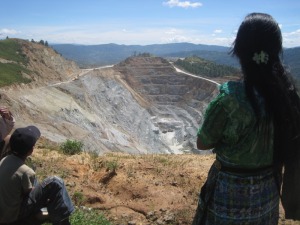Features
THE WAL-MART CORRUPTION CASE: INNOCENTS ABROAD?
by David L. Wilson, World War 4 Report
On April 22 the New York Times ran a major article by reporter David Barstow revealing that Wal-Mart's Mexican subsidiary paid more than $24 million in bribes to fuel the remarkable growth of its stores—and that top Wal-Mart executives in the United States tried to cover up the criminal activity.
The US media were quick to provide "context" for the scandal. Corruption is endemic in Latin America, we were told; Transparency International rated Mexico number 100 out of 183 countries in its 2011 index on perceived levels of corruption. "The scandal tells you that doing business in the world's fastest-growing markets can be fraught with peril," Time magazine wrote. "[G]raft is not necessarily perceived as a serious crime in some places. It's more a way of doing business." The Times downplayed its own excellent investigative reporting by explaining that in Mexico "bribery and other forms of corruption are taken in stride."
TIBET & ASSAM: PAWNS IN INDIA-CHINA GAME
by Nava Thakuria, World War 4 Report
 Tibetan exiles in India's restive northeast have become increasingly vocal, with a series of recent public meetings and protests in Assam state, demanding liberation for their homeland just across the Sino-Indian border to the north. But Assam itself is home to a separatist movement, with the United Liberation Front of Asom (ULFA) waging a sporadic insurgency that has brought waves of harsh repression from New Delhi over the years. While the Tibetan exile leadership remain silent on Delhi's crackdowns in Assam, the ULFA increasingly looks to China as a patron and supports Beijing's position on Tibet—with movements for autonomy across the disputed border pitted against each other.
Tibetan exiles in India's restive northeast have become increasingly vocal, with a series of recent public meetings and protests in Assam state, demanding liberation for their homeland just across the Sino-Indian border to the north. But Assam itself is home to a separatist movement, with the United Liberation Front of Asom (ULFA) waging a sporadic insurgency that has brought waves of harsh repression from New Delhi over the years. While the Tibetan exile leadership remain silent on Delhi's crackdowns in Assam, the ULFA increasingly looks to China as a patron and supports Beijing's position on Tibet—with movements for autonomy across the disputed border pitted against each other.
DIVIDE AND RULE IN THE LAND OF GOLD
by Frauke Decoodt
 In San Miguel Ixtahuacán, Guatemala, the Mina Marlin gold mine, operated by Canadian giant Goldcorp, has divided indigenous communities through gifts, benefits, and violence. The mine has caused a lot of damage. It has not only had a profound impact on the environment but also on the social cohesion of communities and families in the area, and on their cultural ties with the land.
In San Miguel Ixtahuacán, Guatemala, the Mina Marlin gold mine, operated by Canadian giant Goldcorp, has divided indigenous communities through gifts, benefits, and violence. The mine has caused a lot of damage. It has not only had a profound impact on the environment but also on the social cohesion of communities and families in the area, and on their cultural ties with the land.
THE DARK SIDE OF WIKILEAKS?
by Bill Weinberg, World War 3 Illustrated
The case of Bradley Manning is a morally stark one. Even the UN Special Rapporteur on Torture has censured the United States for its harsh measures against the young man who blew the cover on US atrocities in Iraq through WikiLeaks.
But the voluminous trove of classified diplomatic cables released by WikiLeaks goes far beyond the "Collateral Murder" incident in Iraq. The release of most of this information can be justified in the name of the public's right to know.
However, rights advocates have raised fears that some of the revelations may have placed pro-democracy dissidents at risk in authoritarian regimes. Worse, a WikiLeaks "accredited journalist" is accused of actively collaborating with a dictator. WikiLeaks has failed to meaningfully respond to charges of complicity with grave human rights abuses in Belarus, the country dubbed "Europe's last dictatorship."
SYRIA: THE MYTH OF PALESTINIAN NEUTRALITY
by Budour Hassan, Ma'an News Agency
On July 14, thousands of Palestinian refugees marched in a funeral procession for 11 unarmed protesters shot dead by Syrian security forces in the al-Yarmouk refugee camp. Raucous and seething with rage, mourners chanted for Syria and Palestine, called for the downfall of Bashar Assad’s regime, and sang for freedom.
Whether this burgeoning civil disobedience movement will grow into an open, durable rebellion remains to be seen, but the significance and the potential influence of the latest wave of protests that has swept Syria's largest Palestinian camp cannot be overlooked.
ISRAEL AND IRAN: PROTESTERS UNITE FOR PEACE
Enmity From Above, Amity From Below
by Richard Abernethy, US Marxist-Humanists
 On one level, the threat of war between Israel and Iran is a real conflict, a struggle between two state powers for dominance in the Middle East. On another level, each set of rulers finds in the other a "useful enemy," an external threat that appears to validate its ideology, and consolidate its rule at home.
On one level, the threat of war between Israel and Iran is a real conflict, a struggle between two state powers for dominance in the Middle East. On another level, each set of rulers finds in the other a "useful enemy," an external threat that appears to validate its ideology, and consolidate its rule at home.
In both countries, there is a body of enlightened opinion that opposes the rulers' drive toward war. In an extraordinary new development, Israeli and Iranian dissidents have come together, first over the Internet and more recently in person in Berlin, to oppose the drive to war.
BOLIVIA PUSHES BACK AGAINST GLENCORE
by Carmelo Ruiz-Marrero, CorpWatch Blog
Glencore corporation, the secretive Swiss commodities giant which has become one of the world's biggest traders of grain, oil and minerals, has hit an unlikely roadblock: one of South America's poorest countries. On June 22, the Bolivian government seized the company's Colquiri tin and zinc mine, south of the capital city of La Paz.
Colquiri was the third Glencore operation to be nationalized by Bolivia in the last five years. In 2007 the government seized the Empresa Metalurgica Vinto zinc smelter and in 2010, the government seized the Vinto-Antimonio antimony smelter.
QUEBEC INNU PROTEST PLAN NORD
by Alexis Lathem, Toward Freedom
 On the morning of June 10, a group of Innu people from the community of ManiUtenam, near the Quebec city of Sept Isle, set out on a 360 kilometer march towards a Hydro Quebec dam construction site on the Romaine River. Dressed in florescent vests, they departed from an encampment at the entrance to the reserve, beside Route 138, the only major road in the region, where the group has maintained a continual protest since the end of April.
On the morning of June 10, a group of Innu people from the community of ManiUtenam, near the Quebec city of Sept Isle, set out on a 360 kilometer march towards a Hydro Quebec dam construction site on the Romaine River. Dressed in florescent vests, they departed from an encampment at the entrance to the reserve, beside Route 138, the only major road in the region, where the group has maintained a continual protest since the end of April.
Impossible to miss as vehicles pass along the route, the encampment strikingly asserts the presence of the Innu—who have been consistently ignored by governments and developers as they continue to encroach upon Innu territory.















Recent Updates
1 day 19 hours ago
2 days 18 hours ago
2 days 19 hours ago
2 days 19 hours ago
4 days 20 hours ago
4 days 21 hours ago
4 days 21 hours ago
5 days 22 hours ago
5 days 22 hours ago
6 days 5 min ago